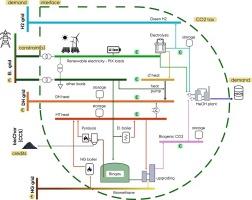Optimizing hydrogen and e-methanol production through Power-to-X integration in biogas plants
IF 9.9
1区 工程技术
Q1 ENERGY & FUELS
引用次数: 0
Abstract
The European Union’s strategy for achieving net zero emissions heavily depends on the development of hydrogen and e-/bio-fuel infrastructure and economy. These fuels are poised to play a critical role, functioning both as energy carriers and balancing agents for the inherent variability of renewable energy sources. Large-scale production will necessitate additional renewable capacity, and various Power-to-X (PtX) concepts are emerging in countries with significant renewable potential. However, sourcing renewable carbon presents a significant challenge in scaling the production of carbon-based e-fuels, and this is anticipated to become a limiting factor in the future. This investigation examines the concept of a PtX hub that sources renewable CO2 from modern biogas plants, integrating renewable energy, hydrogen production, and methanol synthesis at a single site. This concept facilitates an internal, behind-the-meter market for energy and material flows, balanced by an interface with the external energy system. The size and operation of all plants comprising the PtX hub were co-optimized, considering various levels of integration with surrounding energy systems, including the potential establishment of a local hydrogen grid. The levelized costs of hydrogen and e-methanol were estimated for a site commencing operation in 2030, taking into consideration the recent legislation about renewable fuels of non-biological origin (RFNBOs). Our findings indicate that, in its optimal configuration, the PtX hub relies almost exclusively on on-site renewable energy, selling excess electricity to the grid for balancing purposes. The connection to a local hydrogen grid facilitates smoother PtX process operations, while the behind-the-meter market reduces energy prices, providing a buffer against external market variability. The results demonstrate the feasibility of achieving a levelized cost of methanol below 650 € /t and hydrogen production costs below 3 €/kg in 2030. In comparison, a standalone e-methanol plant would incur a 23% higher cost. The ratio of CO2 recovered to methanol produced was identified as a critical technical parameter, with recovery rates exceeding 90% necessitating substantial investments in CO2 and H2 storage. Overall, our findings support the planning of PtX infrastructures that consider integration with the agricultural sector as a cost-effective pathway to access renewable carbon resources.

通过沼气厂的 Power-to-X 集成优化氢气和电子甲醇的生产
欧盟实现净零排放的战略在很大程度上取决于氢能和电子/生物燃料基础设施和经济的发展。这些燃料将发挥关键作用,既可作为能源载体,又可平衡可再生能源固有的多变性。大规模生产将需要更多的可再生能源,在可再生能源潜力巨大的国家,各种 "电力到 X"(PtX)概念正在兴起。然而,在大规模生产碳基电子燃料的过程中,获取可再生碳是一个重大挑战,预计这将成为未来的一个限制因素。本研究探讨了 PtX 中心的概念,该中心从现代沼气厂获取可再生二氧化碳,将可再生能源、氢气生产和甲醇合成整合在一个地点。这一概念有助于形成一个内部的、表后能源和材料流市场,并通过与外部能源系统的接口实现平衡。考虑到与周边能源系统不同程度的整合,包括建立本地氢气电网的可能性,对组成 PtX 中心的所有工厂的规模和运营进行了共同优化。考虑到最近有关非生物源可再生燃料(RFNBOs)的立法,对 2030 年开始运行的工厂的氢气和电子甲醇的平准化成本进行了估算。我们的研究结果表明,在最佳配置下,PtX 中心几乎完全依靠现场可再生能源,将多余的电力出售给电网用于平衡目的。与当地氢气电网的连接有利于 PtX 流程更顺畅地运行,而表后市场则降低了能源价格,为外部市场变化提供了缓冲。研究结果表明,2030 年实现甲醇平准化成本低于 650 欧元/吨和制氢成本低于 3 欧元/千克是可行的。相比之下,独立的电子甲醇厂的成本将高出 23%。二氧化碳回收与甲醇生产的比率被认为是一个关键的技术参数,如果回收率超过 90%,就必须在二氧化碳和氢气储存方面进行大量投资。总之,我们的研究结果支持对 PtX 基础设施进行规划,将其与农业部门的整合作为获取可再生碳资源的一种具有成本效益的途径。
本文章由计算机程序翻译,如有差异,请以英文原文为准。
求助全文
约1分钟内获得全文
求助全文
来源期刊

Energy Conversion and Management
工程技术-力学
CiteScore
19.00
自引率
11.50%
发文量
1304
审稿时长
17 days
期刊介绍:
The journal Energy Conversion and Management provides a forum for publishing original contributions and comprehensive technical review articles of interdisciplinary and original research on all important energy topics.
The topics considered include energy generation, utilization, conversion, storage, transmission, conservation, management and sustainability. These topics typically involve various types of energy such as mechanical, thermal, nuclear, chemical, electromagnetic, magnetic and electric. These energy types cover all known energy resources, including renewable resources (e.g., solar, bio, hydro, wind, geothermal and ocean energy), fossil fuels and nuclear resources.
 求助内容:
求助内容: 应助结果提醒方式:
应助结果提醒方式:


